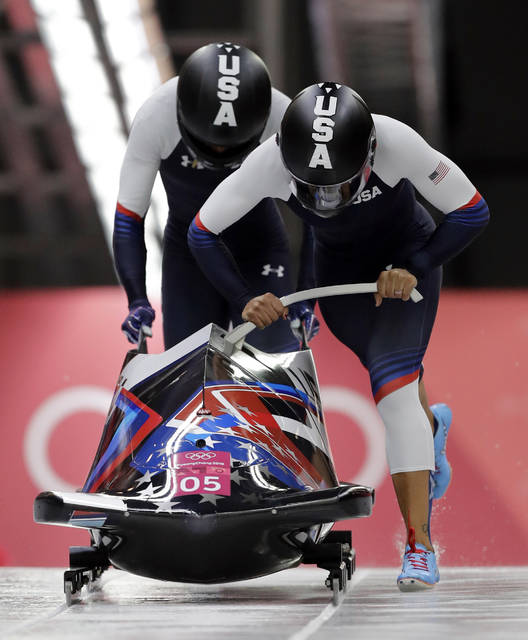PYEONGCHANG, South Korea — Up in the starting area on a frigid night in the mountains, only three women’s bobsled pilots remained. One was the two-time defending Olympic gold medalist. Another was the reigning world champion. And the third was someone without a single victory of any international significance on her resume.
Guess who prevailed?
Women’s bobsledding has a new star, and a surprise Olympic champion. Germany’s Mariama Jamanka — winless in 23 career top-tier starts in her sport coming into the Pyeongchang Games — put together four nearly flawless runs on her way to winning gold at the Alpensia Sliding Center on Wednesday night, holding off Elana Meyers Taylor of the U.S. and Kaillie Humphries of Canada on her way to the medal podium’s top step.
“I still can’t believe it, that we won,” Jamanka said. “I’m absolutely over the moon.”
Jamanka and brakeman Lisa Buckwitz finished their four runs in 3 minutes, 22.45 seconds. Meyers Taylor and Lauren Gibbs of the U.S. were second in 3:22.52, the 0.07-second margin the closest between first and second in any Olympic women’s bobsled race.
“We made Mariama come get it,” said Meyers Taylor, who drove to the world title last year. “And she did.”
Humphries — the gold medalist in 2010 and 2014 — teamed with Phylicia George to get third in 3:22.89. As it was for Meyers Taylor, it was the third Olympic medal for Humphries.
And also like Meyers Taylor, Humphries saluted the new champ afterward.
“She did the business,” Humphries said. “She did it yesterday. She did it here today. She had stiff competition with me and Elana, and it really shows the kind of athlete she is and the mental fortitude that she has.”
Jamanka showed absolute nerves of steel in the ultimate moment to win the 18th Olympic gold medal in German bobsled history, the second by a woman.
And there’s no question who the best team at the sliding track has been in these Pyeongchang Games. With eight of the nine events now complete in bobsled, skeleton and luge, Germany has won five golds and will be a favorite to grab yet another in the four-man event that ends on the final day of the games Sunday.
Stephanie Schneider of Germany was fourth, and Jamie Greubel Poser of the U.S. — the bronze medalist behind Humphries and Meyers Taylor four years ago — took fifth.
“We’re very proud of what we did,” said Aja Evans, Greubel Poser’s brakeman in both Sochi and Pyeongchang. “It’s still tough. It’s going to be tough for a while. But we laid it all on the line, so there’s zero regrets.”
Nigeria, with pilot Seun Adigun and brakewomen Akuoma Omeoga and Ngozi Onwumere — Omeoga was ill and couldn’t race Wednesday, so she was subbed out — finished last in the 20-sled field, nearly four seconds behind 19th-place Jamaica.
The Nigerians were the first sled from an African nation to compete in women’s bobsled at the Olympics. Their presence only added to a sport that has seen no shortage of diversity; four of the six women who won medals Wednesday night are women of color.
“All we have to give is everything we’ve got,” Adigun said.
Meyers Taylor and Jamanka were the last two sleds down the track, and the only two real remaining contenders for gold by that point.
Meyers Taylor finished in 50.73 seconds, jumped out of her sled, threw her arms in the air and celebrated with Gibbs. And then everyone turned their attention to the top of the track, to see if Jamanka could pull off the win.
It wasn’t the greatest start for the Germans, and they trailed Meyers Taylor by 0.13 seconds in one of the early splits. But Jamanka picked the perfect line and kept picking up speed, overtaking Meyers Taylor’s time in one of the final turns.
“I was not that nervous,” Jamanka said, “because I didn’t think how impossible it is to beat them.”
For her, it was only impossible until now.
Jamanka held a lead of 0.07 seconds after Tuesday’s first two runs, and she opened the third heat by breaking Meyers Taylor’s track record — setting the tone for the night with a time of 50.49 seconds.
Undeterred, Meyers Taylor took the record right back.
She was next down the track, crossing the line in 50.46 seconds and cutting the deficit to 0.04 seconds going into the final run. With that, the stage to a gold medal was set for either the upstart German or the American veteran — the one who carried the lead into the fourth heat of the Olympics four years ago and saw it slip away in one steering mistake.
There was no big mistake this time. Meyers Taylor was almost flawless. Jamanka was just a tiny bit better.
“We came up short, but me and Lauren gave everything we had until the very last hundredth,” Meyers Taylor said. “We won a silver medal.”
———
More AP Olympics: https://wintergames.ap.org



